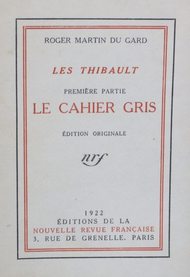1937 Nobel Prize in Literature
The 1937 Nobel Prize in Literature was awarded to the French author Roger Martin du Gard (1881–1958) "for the artistic power and truth with which he has depicted human conflict as well as some fundamental aspects of contemporary life in his novel-cycle Les Thibault".
[1] Roger Martin du Gard was awarded for the then seven-part (a final eight part was later published) novel cycle Les Thibault (1922-1940), that chronicles a family of the bourgeoisie from the turn of the 19th century to World War I.
His other work includes the novel Jean Barois (1913) that deals with the conflict between the Roman catholic faith of his childhood and the scientific materialism of his maturity and the impact of the Dreyfus affair on the protagonist, sketches of French country life in Vielle France ("Old France", 1933), a study of the author and his friend André Gide (Notes sur André Gide, 1951), and dramas.
It follows intricately the fortunes of two brothers, Antoine and Jacques Thibault, from their upbringing in a prosperous Catholic bourgeois family to the end of the First World War.
[5] The authors Lou Andreas-Salomé, J. M. Barrie, Ellis Parker Butler, Aleksey Chapygin, Ralph Connor, Francis de Croisset, Alberto de Oliveira, John Drinkwater, Florence Dugdale, Edward Garnett, Antonio Gramsci, Frances Nimmo Greene, Ivor Gurney, Elizabeth Haldane, Élie Halévy, W. F. Harvey, Ilya Ilf, Attila József, H. P. Lovecraft, Don Marquis, H. C. McNeile, Dashdorjiin Natsagdorj, Rudolf Otto, Mittie Frances Point (known as Mrs. Alex.
